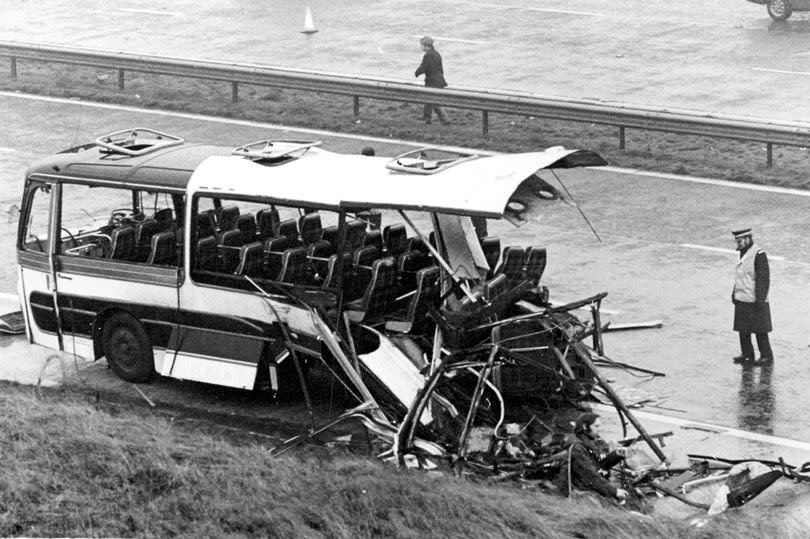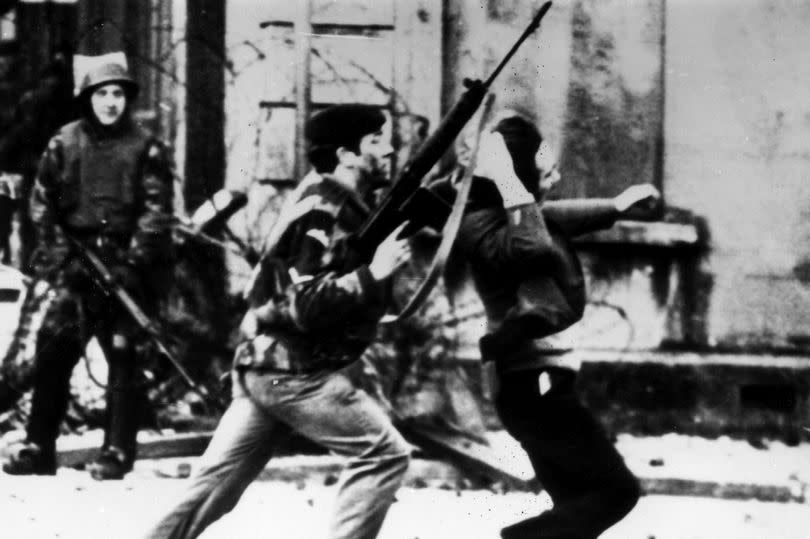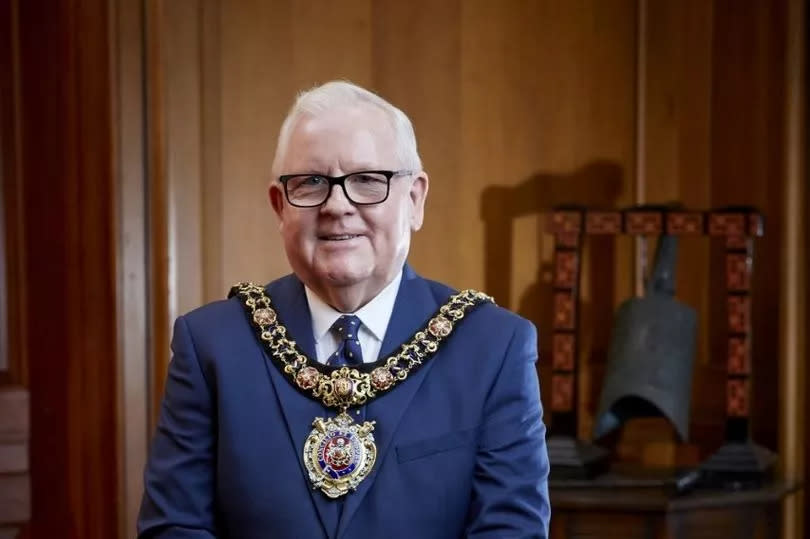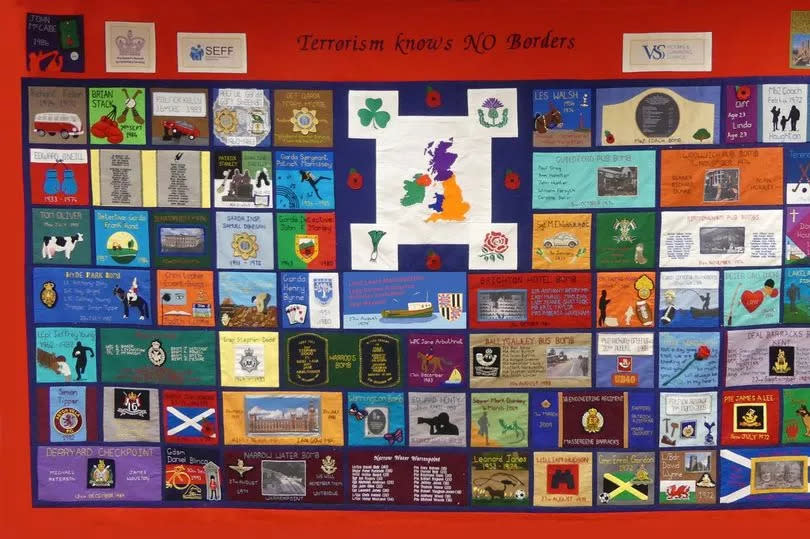'There was a flash of light - suddenly, I couldn't hear the children anymore'

Tommy Judge was running late for his coach because he was at the pub. It likely saved his life.
Born in Manchester to Irish parents, the Manchester councillor and ex-Lord Mayor was recruited into the army when he was just 14 years old while out on Market Street. He trained in Dorset at Bovington Camp for two years, until he qualified as an officer and was stationed at Catterick in north Yorkshire.
On a February weekend in 1974, the then 17-year-old had returned to his hometown of Manchester from Catterick to celebrate his cousin's 18th birthday. On the way back, his coach, carrying off-duty soldiers and their families, was blown up by an 11 kilogram IRA bomb planted inside the luggage locker. Twelve people were killed, and another 38 injured - Tommy was lucky enough to survive unharmed.
READ MORE: Zoned out and frozen on a busy Manchester morning
The Sharston councillor is speaking to the M.E.N ahead of what he called a 'vitally important' memorial exhibition and service at Manchester Cathedral honouring innocents who were killed during The Troubles, and commissioned by the South East Fermanagh Foundation (SEFF). The organisation is formed of a group of victims and survivors of The Troubles, with the aim of helping innocent victims of terrorism in the country.
The Troubles
Between the 1960s to late 1990s, tensions between the Catholics and Protestants in Northern Ireland gave way to the sectarian conflict known as 'The Troubles'. The two held deeply differing views on whether Northern Ireland should be part of the United Kingdom, or join with the republic of Ireland.

The British Government ordered the deployment of troops to Northern Ireland in August 1969. Some Catholics initially welcomed the British Army, seeing them as a neutral force. But following Bloody Sunday, where British paratroopers opened fire on a civil rights march and killed 14 people in Derry in 1972, attitudes towards the British Army soured.
An era fraught with violence, bombings, and revenge killings, it is estimated that some 3,600 people died and 30,000 were injured during The Troubles.
Tommy's story
It was a riotous party, and Tommy remembers waking up on the Sunday feeling worse for wear.
He was due to return to Catterick that evening on an army bus, but was persuaded into a pint down the pub with his dad - "One turned into two, two turned into three," he recalled. "And we were running late."
The teen had hoped to bag the back seats of the coach so he could lie down and sleep off the booze - but when he arrived late at Chorlton Street coach station, he found it had already been taken by a young family. Instead, he was forced to sit a few rows in front.
"My plan was get on the back seat, get my head down and go to sleep," Coun. Judge told the Manchester Evening News. "It was quite a busy coach, and because I was late getting there the back seat was already taken. So I ended up sitting about four rows from the back."
He remembers the coach taking a detour to Oldham to pick up a young Corporal and his family whose car had broken down. The group were then offered the back row of seats by the men previously occupying them.
The man was 23-year-old Corporal Clifford Haughton, along with his wife, Linda (also 23), and sons Lee, aged 5, and Robert, 2. Just hours later, all four of them would be dead.
"We set off and I'm trying to make myself comfortable," Tommy recalled. "We were going along just outside of Huddersfield and I sort of nodded off."

He remembers waking up just after midnight to the sound of the radio and listening to the news. He could hear the two children at the back of the coach, and distinctly remembers one laughing and one crying. Then, a flash of light.
"I had no idea it was an explosion at the beginning of it," he said. "I was looking around to see what happened. The floor of the coach had gone, all the windows were smashed, and the roof had peeled off. I looked behind me, and there was nothing behind me.
"At first I thought a wagon had gone into the back of us - but then it dawned on me that there was nothing else there."
Tommy was able to use the main frame of the coach to clamber off, alongside around seven others who were able to, and stop the traffic on the carriageway. It was only then that he realised the extent of the wreckage.
"It hit me straight away that I couldn't hear the children," he said. "There was just total silence except for the cars going past on the motorway.
"I was 17, a few months short of my 18th birthday. And I was seeing sights that nobody, no matter what age you are, should have to see or go through. It's something you never forget, it's always there."
The coach had been hit by an IRA bomb in what would come to be known as the M62 coach bombing. Later that year, two pub bombings in Birmingham left 21 dead and injured more than 180 others.
Tommy and the other passengers who escaped unharmed were taken to Hartshead Services to be interviewed by police following the explosion. He remembers the moment he realised he had been caught in an IRA bombing.
"I remember this policeman asked me, 'do you know anybody Irish?'. So I said yes - my mum and dad. He asked me for their names and it hit me then what he was saying. That has always stuck with me - I thought, he can't be serious, asking me questions like that."
Tommy said he had always had an awareness of The Troubles because of his parentage. "My dad came from Sligo and my mother came from County Kildare," he explained. "I've always had an interest in it because it was in Ireland. I've been there for summer holidays, that's where my granddad's from.
"It felt really strange in this part of the world where I used to go for summer holidays, people fight and killing one another."
Tommy was unlucky enough to be caught in a second bombing four years later while stationed in Northern Ireland. Once again, he survived, and says he knew he was a 'target' because he was serving. But he says the M62 coach explosion will stay with him 'forever'.
"There are some heartbreaking stories out there," he said. "Those children, they had nothing to do with anything. They were completely innocent. Years later, I found out there was one young man who swapped places with another - he lost his life and the other man survived.
"I found out that the guy that survived used to take the mother of the guy that died to the shops every week and do what sons would do."
He said throughout his life he has been able to 'cope' with the trauma of the bombing, but 'fully understands' those who can't.
"I might get an image or a sound or something like that, but at the moment I've got the ability to make myself do something else," he added. "But I fully understand that some people get these things and they don't go away.

"Young people now don't remember Northern Ireland or understand what went on there," he said. "Belfast is only around 40 minutes away, it's not like it's the other side of the world. They've come a long way from where they were, things are a lot better.
"But we should never forget."
Described as a 'tribute to innocence' by SEFF's director Kenny Donaldson, he said the exhibition may have more relevance to people than they expect. "It's about people having a wider awareness of their nation and the fact that The Troubles spread out far and wide," he added.
"There is a strong Irish community living in the Greater Manchester area - it would be great for people to come and understand how deeply this affected their own nation."
The Memorial Quilts exhibition is at Manchester Cathedral until Friday, 28 June 2024. A remembrance service will be held at the Cathedral on Sunday, June 23.

 Yahoo News
Yahoo News 
